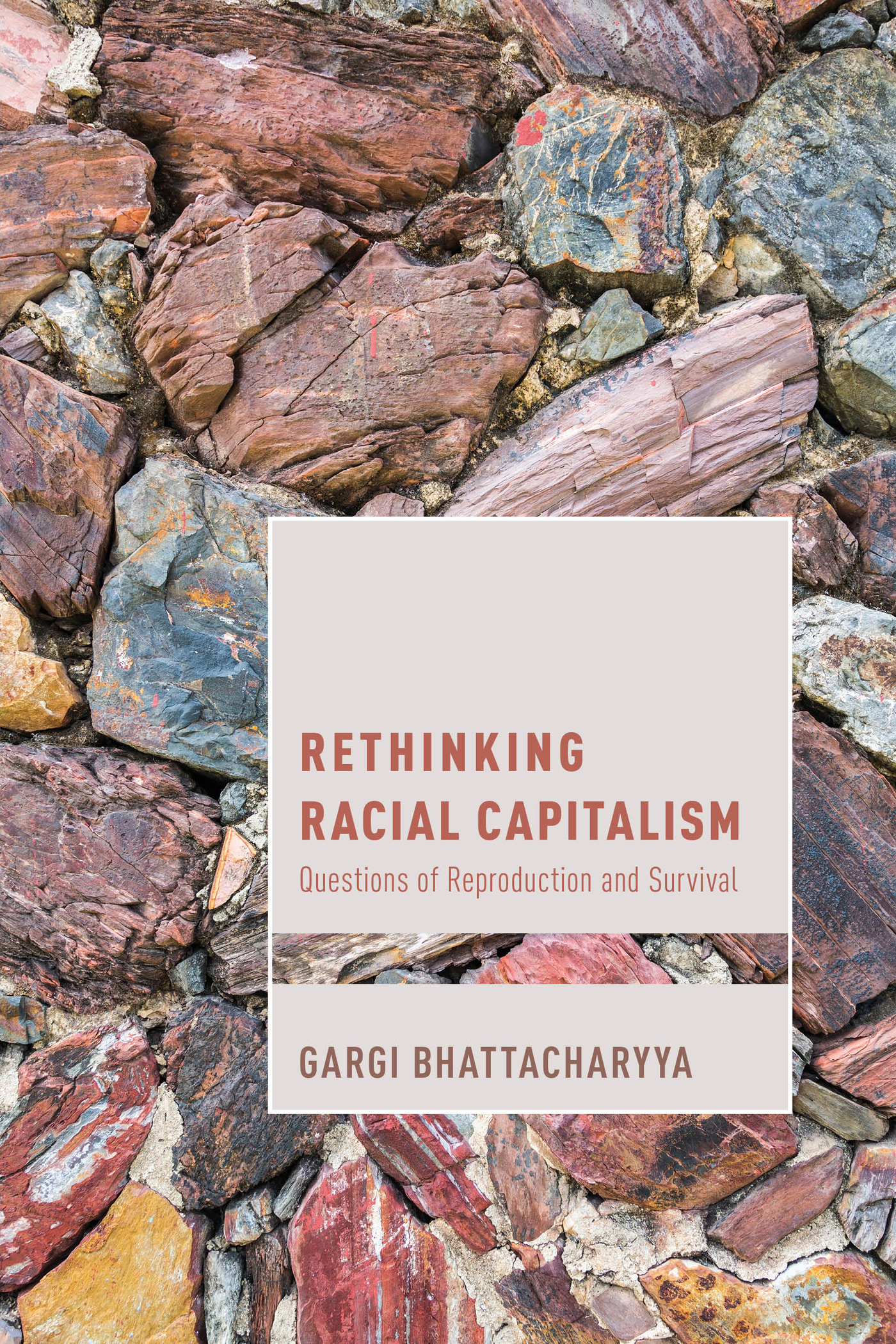Rethinking Racial Capitalism
Cultural Studies and Marxism
Series Editor: Jaafar Aksikas, Columbia College Chicago
The Cultural Studies and Marxism series is a timely and valuable contribution to the larger field of contemporary cultural studies. The global capitalist crisis of the twenty-first century has prompted renewed interest in critical political economy and Marxist theory. At the same time, publishing institutions committed to a robust articulation between cultural studies, critical political economy, and Marxism are almost non-existent. The series is dedicated to addressing this situation by highlighting and making available important (and emergent) scholarship at the intersection of these three fields.
Titles in the Series
Hegemony, Mass Media and Cultural Studies, by Sean Johnson Andrews
Rethinking Racial Capitalism: Questions of Reproduction and Survival, by Gargi Bhattacharyya
Rethinking Racial Capitalism
Questions of Reproduction and Survival
Gargi Bhattacharyya

London New York
Published by Rowman & Littlefield International, Ltd.
Unit A, Whitacre Mews, 26-34 Stannary Street, London SE11 4AB
www.rowmaninternational.com
Rowman & Littlefield International, Ltd., is an affiliate of
Rowman & Littlefield
4501 Forbes Boulevard, Suite 200, Lanham, Maryland 20706, USA
With additional offices in Boulder, New York, Toronto (Canada), and London (UK)
www.rowman.com
Copyright 2018 by Gargi Bhattacharyya
All rights reserved. No part of this book may be reproduced in any form or by any electronic or mechanical means, including information storage and retrieval systems, without written permission from the publisher, except by a reviewer who may quote passages in a review.
British Library Cataloguing in Publication Information
A catalogue record for this book is available from the British Library
ISBN: HB 978-1-78348-884-1
ISBN: PB 978-1-78348-885-8
Library of Congress Cataloging-in-Publication Data Available
ISBN: 978-1-78348-884-1 (cloth : alk. paper)
ISBN: 978-1-78348-885-8 (pbk. : alk. paper)
ISBN: 978-1-78348-886-5 (electronic)
 TM The paper used in this publication meets the minimum requirements of American National Standard for Information SciencesPermanence of Paper for Printed Library Materials, ANSI/NISO Z39.48-1992.
TM The paper used in this publication meets the minimum requirements of American National Standard for Information SciencesPermanence of Paper for Printed Library Materials, ANSI/NISO Z39.48-1992.
Printed in the United States of America
In memory of Jolyon Jones
Introduction
Ten Theses on Racial Capitalism
Racial capitalism is a way of understanding the role of racism in enabling key moments of capitalist developmentit is not a way of understanding capitalism as a racist conspiracy or racism as a capitalist conspiracy. To explain this point a little more: the analysis of the productivity of racialisation in the service of capitalism should notmust notbe read as an allegation of intentionality. There are racists in the world and some of them have profited through exploitation, but racial capitalism does not emerge as a result of a plan. No one maps out this programme and then enacts it. What we seek to understand is the place of racialisation in particular instances of capitalist formation, most of all when those instances are now.
To understand racial capitalism, we must revisit our understanding of the value of work and the conception of some activity as non-work. This section of the discussion to follow borrows heavily from feminist debates about the conception of work and an expanded conceptualisation of social reproduction allows us to understand the racialised differentiation of populations as enabling forms of supplementarity beyond households.
Accounts of racial capitalism cannot act as metatheories of racism. Racism has a distinctive history that precedes capitalism.
Racial capitalism operates both through the exercise of coercive power and through the mobilisation of desire. People are not only forced to participate in economic arrangements that cast them to the social margins; they also rush to be included in this way and to become edge-subjects of capitalism.
Racial capitalism includes the sedimented histories of racialised dispossession that shape economic life in our time, but is never reducible to those histories. There are new and unpredictable modes of dispossession to be understood alongside the centuries-old carnage that moistens the earth beneath our feet.
Racial capitalism helps us to understand how people become divided from each other in the name of economic survival or in the name of economic well-being. One aspect of its techniques encompass the processes that appear to grant differential privileges to workers and almost workers and non-workers and the social relations that flow from these differentiations.
Although the insights of scholars of intersectionality interweave with the discussion that follows, this is not an account of the intersectionality of capitalism. Neither is it an argument for the primacy of race. Racial capitalism describes a set of techniques and a formation, and in both registers the disciplining and ordering of bodies through gender and sexuality and dis/ability and age flow through what is happening. I continue to call this racial capitalism because these techniques of othering and exclusion utilise the logics of race, regardless of the targeted population.
The racial capitalism that I seek to describe here is intimately intertwined with the processes precipitating ecological crisis. The myth of expendabilityof expendable peoples and expendable regionshaunts our time and is a key motor of the forms of capitalist development that operate on the assumption that some populations will never be included and will never reach viability or sustainability.
The logics of racial capitalism suggest that capitalism cannot be fixed or adapted in a way that allows us all to be equal or all forms of humanity to be valued. This is not to say that change does not occur and that some historical disadvantages cannot be ameliorated. However, it is to argue that capitalism cannot function if we all are allowed to become fully human. Dehumanisation seems to be an unavoidable outcome of the processes of capitalist development.
Racial capitalism is a way of understanding why we seem to be so divided and yet remain so intimately intertwined with each other. It is a description, not a manifesto. As always, what comes next is to be decided elsewhere.
Let us start at the very beginning, a very good place to start.
Of course, this is not a story about all human life. Who could imagine such a thing, let alone embark on its telling? Class struggle may be the story of all human history, but it is not a one-volume job. Strictly for the instalment market.
The history of capitalism, on the other hand, thats a much more bite-size endeavour. Not a tiny morsel but only a small-sigh chunk in the history of humanity. So, racial capitalism. That might be the story of all human life but only in this instant. A snapshot of what feels like the longue dure to us but which is in reality a mere blinking of an eye. The human suffering of generationsall no more than one more ugly episode in the perpetual stand-off between those who have and those who do not.

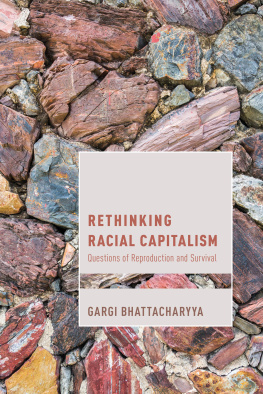


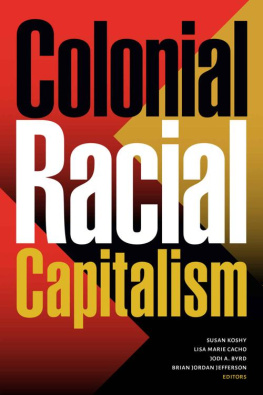
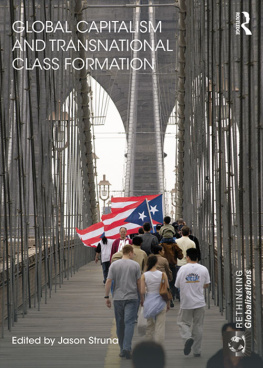

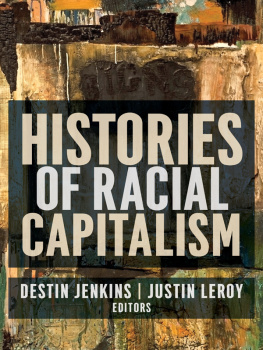
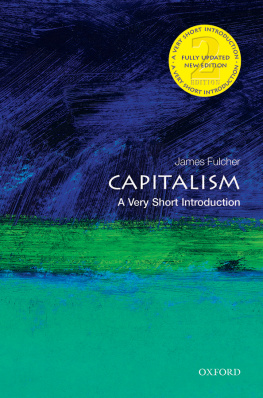
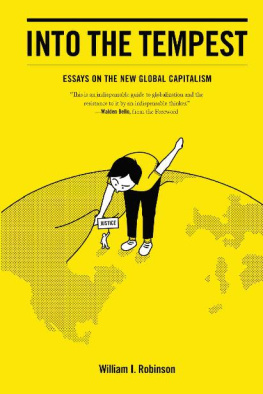
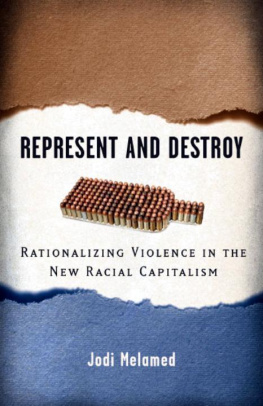
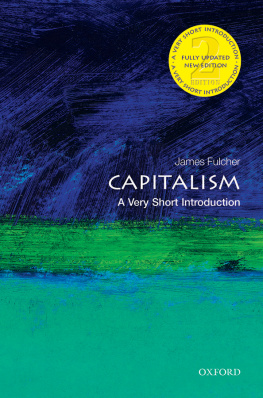

 TM The paper used in this publication meets the minimum requirements of American National Standard for Information SciencesPermanence of Paper for Printed Library Materials, ANSI/NISO Z39.48-1992.
TM The paper used in this publication meets the minimum requirements of American National Standard for Information SciencesPermanence of Paper for Printed Library Materials, ANSI/NISO Z39.48-1992.